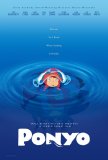Ponyo (Japan, 2008)
August 14, 2009
In some ways, watching Ponyo, the latest effort from Japanese master animator Hayao Miyazaki, is like taking a trip back into time. These days, everything to come out of American animated houses is computer-generated and/or 3-D. Gone are the times when one of the joys of animation was sitting back and absorbing the artwork and recognizing how much effort went into crafting so many hand-drawn cells. Ponyo, however, is old-school, and watching it after seeing so many computer-assisted animated features is like gazing at a Monet after spending decades seeing photographs. It may be less realistic and lifelike but in some ways, it's more alive.
Ponyo represents a step down in narrative sophistication for Miyazaki. Not to say that this movie is simplistic or juvenile, but it has been produced with the goal of appealing to children more than some of the filmmaker's previous efforts, which were often considered too "mature" or "complex" for younger viewers. Although Ponyo includes a subtle environmentalist message and says some important things about man's relationship to nature, it is fundamentally a fairy tale that borrows heavily from The Little Mermaid and Pinocchio, both stories likely familiar in their Disney incarnations to most potential viewers.
The voice work of the U.S. version (a separate soundtrack was prepared, with care taken to match the dialogue as closely as possible to the lip movements of the animated characters to avoid "dubbing stutter") features contributions from newcomers and veterans alike. The two young main characters are played by the siblings of actors in the Disney stable. Frankie Jonas, who represents 5-year old Sosuke, is the younger brother of The Jonas Brothers. Noah Lindsey Cyrus, who is Ponyo, is the daughter of Billy Ray Cyrus and the sister of Hannah Montana's alter-ego. I can't say they're any better or worse than the likes of Liam Neeson, Tina Fey, Matt Damon, Cate Blanchett, Lily Tomlin, Cloris Leachman, and Betty White, all of whom are easily identified because of their recognizable voices (except perhaps Fey). But it's really the visuals and not the voices that capture the attention. The film's underwater opening sequence is breathtaking, easily surpassing anything in either The Little Mermaid or Finding Nemo, and the later scenes with roiling waves and prehistoric fish swimming beneath the surface, are arresting. (Take a look at the trailer below for a sample of the magic Miyazki can conjure. Those unfamiliar with his work may be stunned.) It wouldn't be a stretch to call Ponyo art with a storyline, painting with a narrative. The experience of watching it is so much different than that of sitting through something like Up, as rich and satisfying as that may be.
Ponyo's story is in many ways the least interesting aspect of the movie. It keeps things moving along and provides a reason for the animation, but it's no match for Miyazaki's best (for me, that would be Spirited Away, with Princess Mononoke coming in a close second). The movie begins deep under the ocean where Ponyo (voice of Noah Lindsey Cyrus), the goldfish mermaid daughter of the wizard Fujimoto (Liam Neeson), longs for a glimpse of the world above. When her father isn't looking, she makes a break for the surface. There, she is found by the boy Sosuke (Frankie Jonas), who is playing by the seaside. He places Ponyo in a bucket and brings her home with him. Eventually, her father sends crashing waves to reclaim her. When she is gone, Sosuke is heartbroken, but his mother, Lisa (Tina Fey), comforts him by telling him it's for the best - she is, after all, a fish. But Ponyo will not be denied her new love of life above the waves and her affection for Sosuke. She uses magic to transform herself into a girl and returns to the surface. But the forces she unleashes to affect the transformation unbalance nature and as the moon drifts closer to the earth, the tides begin to rise. It becomes up to Sosuke and Ponyo to restore the balance.
It has been about five years since Miyazaki's exports last received reasonably wide distribution in the United States, so many kids in the film's target group have not been exposed to this brand of animation. The success (or lack thereof) of Ponyo may represent a litmus test as to whether there's still a children's audience for this sort of animated fare in North America. My sense is that adults will be more taken with Ponyo than their offspring. Even though Ponyo is not one of Miyazaki's great masterpieces (at least from a narrative perspective), it is so beautiful and immersive that it's hard to imagine grown ups not losing themselves in it. Hopefully, the same will be true of the newest generation.
Ponyo (Japan, 2008)
Cast: (voices) Frankie Jonas, Lily Tomlin, Jennessa Rose, Cloris Leachman, Cate Blanchett, Liam Neeson, Matt Damon, Tina Fey, Noah Lindsey Cyrus, Betty White
Screenplay: Hayao Miyazaki
Cinematography: Atsushi Okui
Music: Jo Hisaishi
U.S. Distributor: Walt Disney Pictures
- (There are no more better movies of (voices) Frankie Jonas)
- (There are no more worst movies of (voices) Frankie Jonas)
- (There are no more better movies of Jennessa Rose)
- (There are no more worst movies of Jennessa Rose)

Comments